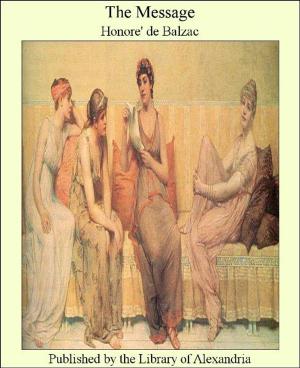| Author: | John Tulloch | ISBN: | 9781465529251 |
| Publisher: | Library of Alexandria | Publication: | March 8, 2015 |
| Imprint: | Language: | English |
| Author: | John Tulloch |
| ISBN: | 9781465529251 |
| Publisher: | Library of Alexandria |
| Publication: | March 8, 2015 |
| Imprint: | |
| Language: | English |
The younger sister, Jacqueline, has been made a special study by M. Cousin amongst the ‘Illustrious Women of the Seventeenth Century.’ She was beautiful as her sister, and a child of genius like her brother. She began to compose verses at the age of eight, and in her eleventh year assisted in the composition and the acting of a comedy in five acts, which was a subject of universal talk in Paris. Her powers, both as an actor and a verse-maker, made a wonderful reputation at the time, which, as we shall see, was highly serviceable to her after. Her verses, it must be confessed, are somewhat artificial and hollow; but her letters, and, more remarkable than either her verses or her letters, her ‘Thoughts’ on the ‘Mystery of the Death of Christ,’ are in some respects very fine, and might even claim a place beside some of those of her brother. They are equally elevated in tone, and pervaded by the same subtle, penetrating, radiant mysticism, the same rapture of self-sacrificing aspiration, though lacking the glow of inward fire and exquisite charm of style which marked the author of the ‘Pensées.’ Noble-minded and full of genius, she was yet without his depth and power of feeling, or his skill and finish as an author. In 1646 she came, along with her brother, and greatly through his influence, strongly under the power of religion; and in 1652, after her father’s death, she renounced the world, and became one of the Sisters of Port Royal. She died amidst the persecution of the Sisters in 1661, a year before her brother. There never certainly was a more singular story of youthful precocity than that which Madame Périer has given of her brother, accustomed as we have become to such stories in the lives of eminent men. Detecting the remarkable powers of the boy, his father had formed very definite resolutions as to his education. His chief maxim, Madame Périer says, was always “to keep the boy above his work.” And for this reason he did not wish him to learn Latin till he was twelve years of age, when he might easily acquire it. In the meantime, he sought to give him a general idea of grammar—of its rules, and the exceptions to which these rules are liable—and so to fit him to take up the study of any language with intelligence and facility. He endeavoured Further to direct his son’s attention to the more marked phenomena of nature, and such explanations as he could give of them. But here the son’s perception outstripped the father’s power of explanation. He wished “to know the reason of everything;” and when his father’s statements did not appear to him to give the reason, he was far from satisfied. “For he had always an admirable perspicacity in discerning what was false; and it may be said that in everything and always truth was the sole object of his mind. From his childhood he could only yield to what seemed to him evidently true; and when Others spoke of good reasons, he tried to find them for himself. He never quitted a subject until he had found some explanation which satisfied him.” Once, among Other occasions, he was so interested in the fact that the sound emitted by a plate lying on a table when struck, suddenly ceased on the plate being touched by the hand, that he made an inquiry into sound in general, and drew so many conclusions that he embodied them in a “well-reasoned” treatise. At this time he was only twelve years of age. At the same age he gave still more astonishing evidence of his precocious scientific capacities. His father, perceiving his strong scientific bent, and desirous that he should first of all acquaint himself with languages before the absorption of the severer, but more engrossing, study seized him, had withdrawn from his sight all mathematical books, and carefully avoided the subject in the presence of his son when his friends were present. This, as might be expected, only quickened the curiosity of the boy, who frequently begged his father to teach him mathematics, and the father promised to do so as a reward when he knew Latin and Greek, which he was then learning. Piqued by this resistance, the boy asked one day, “What mathematical science was, and of what it treated?” He was told that its aim was to make figures correctly, and to find their right relations or proportions to one another. He began, says his sister, to meditate during his play-hours on the information thus communicated to him
The younger sister, Jacqueline, has been made a special study by M. Cousin amongst the ‘Illustrious Women of the Seventeenth Century.’ She was beautiful as her sister, and a child of genius like her brother. She began to compose verses at the age of eight, and in her eleventh year assisted in the composition and the acting of a comedy in five acts, which was a subject of universal talk in Paris. Her powers, both as an actor and a verse-maker, made a wonderful reputation at the time, which, as we shall see, was highly serviceable to her after. Her verses, it must be confessed, are somewhat artificial and hollow; but her letters, and, more remarkable than either her verses or her letters, her ‘Thoughts’ on the ‘Mystery of the Death of Christ,’ are in some respects very fine, and might even claim a place beside some of those of her brother. They are equally elevated in tone, and pervaded by the same subtle, penetrating, radiant mysticism, the same rapture of self-sacrificing aspiration, though lacking the glow of inward fire and exquisite charm of style which marked the author of the ‘Pensées.’ Noble-minded and full of genius, she was yet without his depth and power of feeling, or his skill and finish as an author. In 1646 she came, along with her brother, and greatly through his influence, strongly under the power of religion; and in 1652, after her father’s death, she renounced the world, and became one of the Sisters of Port Royal. She died amidst the persecution of the Sisters in 1661, a year before her brother. There never certainly was a more singular story of youthful precocity than that which Madame Périer has given of her brother, accustomed as we have become to such stories in the lives of eminent men. Detecting the remarkable powers of the boy, his father had formed very definite resolutions as to his education. His chief maxim, Madame Périer says, was always “to keep the boy above his work.” And for this reason he did not wish him to learn Latin till he was twelve years of age, when he might easily acquire it. In the meantime, he sought to give him a general idea of grammar—of its rules, and the exceptions to which these rules are liable—and so to fit him to take up the study of any language with intelligence and facility. He endeavoured Further to direct his son’s attention to the more marked phenomena of nature, and such explanations as he could give of them. But here the son’s perception outstripped the father’s power of explanation. He wished “to know the reason of everything;” and when his father’s statements did not appear to him to give the reason, he was far from satisfied. “For he had always an admirable perspicacity in discerning what was false; and it may be said that in everything and always truth was the sole object of his mind. From his childhood he could only yield to what seemed to him evidently true; and when Others spoke of good reasons, he tried to find them for himself. He never quitted a subject until he had found some explanation which satisfied him.” Once, among Other occasions, he was so interested in the fact that the sound emitted by a plate lying on a table when struck, suddenly ceased on the plate being touched by the hand, that he made an inquiry into sound in general, and drew so many conclusions that he embodied them in a “well-reasoned” treatise. At this time he was only twelve years of age. At the same age he gave still more astonishing evidence of his precocious scientific capacities. His father, perceiving his strong scientific bent, and desirous that he should first of all acquaint himself with languages before the absorption of the severer, but more engrossing, study seized him, had withdrawn from his sight all mathematical books, and carefully avoided the subject in the presence of his son when his friends were present. This, as might be expected, only quickened the curiosity of the boy, who frequently begged his father to teach him mathematics, and the father promised to do so as a reward when he knew Latin and Greek, which he was then learning. Piqued by this resistance, the boy asked one day, “What mathematical science was, and of what it treated?” He was told that its aim was to make figures correctly, and to find their right relations or proportions to one another. He began, says his sister, to meditate during his play-hours on the information thus communicated to him















